Home | Class News | 50th Reunion | Past Reunions | Other Gatherings | Newsletter Archive | Links | Memorials | Classmates Search | Classmates Found | Former Faculty | Contacts |
![]()
Remembering Richard Bethards
Ned Groth, September, 2010
(Author’s note: This biographical remembrance is based on documents and personal communications, including yearbooks, class newsletters, letters Richard wrote to me, conversations we had, and my own recollections. I have woven in a few anecdotes from other classmates, other alumni, former faculty, and members of Richard’s family. My goal is to create an honest and loving portrait of our former master, as we knew him. While I’ve striven for factual accuracy, I take full responsibility for any errors. This remembrance can be amended, if need to be, as others contribute their own memories to it. –NG)
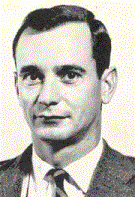
In the years since we (as Richard taught us) were graduated, we’ve had countless discussions about our former teachers. Who was the most inspiring in the classroom? Who was the most “colorful” (to use a relatively non-judgmental term) character? We each have our own answers to those questions. For me, Richard was my most memorable teacher, and near the top in the second category as well.
We first met Richard at the start of our sophomore year, in the fall of 1959. He had taught at Darrow from 1953 to ‘56, then had taken a leave of absence, teaching in Turkey. The school got a dividend when he returned, as Ron Emery, with whom Richard had taught in Turkey, also joined the faculty that year. Ron taught us sophomore English, and Richard taught the junior class. While Ron regaled us with stories about Esmé, love, and squalor, and taught us sentence diagramming via the adventures of Tandeleo Phaphufnik, we began hearing rumors about some of Richard’s rather unusual instructional methods.
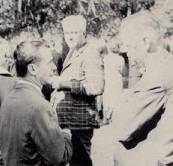 Those of us who returned as juniors the next year would learn about Richard’s pedagogical style first-hand, soon enough. Meanwhile, we were getting to know this bantam-sized man with a larger-than-life personality through daily campus interactions. Richard was witty, urbane, sardonic. He was well educated (a B.A. from William and Mary in 1949, where he was elected to Phi Beta Kappa; an M.A. from Harvard the following year; graduate study at the University of Marburg, Germany, in 1951-52.) He could be totally charming (as shown here, chatting up parents) or wittily arrogant and off-putting. Richard was terribly bright, and terribly articulate. Des McCracken felt intimidated by Richard’s intellect, initially. “He was so confident and self-assured,” Des recalls. Des recalls catching Richard in an error now and then. “He’d never really admit it,” says Des. Richard would wave his hand and say “Yes, yes, of course,” as if the matter were obvious and his error trivial, and breeze on with whatever he was saying.
Those of us who returned as juniors the next year would learn about Richard’s pedagogical style first-hand, soon enough. Meanwhile, we were getting to know this bantam-sized man with a larger-than-life personality through daily campus interactions. Richard was witty, urbane, sardonic. He was well educated (a B.A. from William and Mary in 1949, where he was elected to Phi Beta Kappa; an M.A. from Harvard the following year; graduate study at the University of Marburg, Germany, in 1951-52.) He could be totally charming (as shown here, chatting up parents) or wittily arrogant and off-putting. Richard was terribly bright, and terribly articulate. Des McCracken felt intimidated by Richard’s intellect, initially. “He was so confident and self-assured,” Des recalls. Des recalls catching Richard in an error now and then. “He’d never really admit it,” says Des. Richard would wave his hand and say “Yes, yes, of course,” as if the matter were obvious and his error trivial, and breeze on with whatever he was saying.
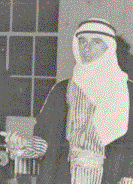 Richard was not shy; he had a flair for the dramatic and some experience as an actor, and he enjoyed being the center of attention. This photo from the 1960 yearbook shows Richard in costume one night. The Arab outfit was one of many things he brought back from his three years in the Middle East. He smoked awful-smelling Turkish (he called them “camel dung”) cigarettes. His apartment in Hinckley House was adorned with a camel saddle, camel bells and whip, a brass table from a Moroccan restaurant, and other exotica. He’d sometimes answer our questions in Turkish (usually with “evet, efendim” [yes sir] or “yok, efendim” [no sir].) Richard could be witty even in a tongue his listeners didn’t understand.
Richard was not shy; he had a flair for the dramatic and some experience as an actor, and he enjoyed being the center of attention. This photo from the 1960 yearbook shows Richard in costume one night. The Arab outfit was one of many things he brought back from his three years in the Middle East. He smoked awful-smelling Turkish (he called them “camel dung”) cigarettes. His apartment in Hinckley House was adorned with a camel saddle, camel bells and whip, a brass table from a Moroccan restaurant, and other exotica. He’d sometimes answer our questions in Turkish (usually with “evet, efendim” [yes sir] or “yok, efendim” [no sir].) Richard could be witty even in a tongue his listeners didn’t understand.
The Peg Board photo at right below is from the school Halloween party in 1959. Richard, dressed as Othello, I think, chats here with Miss Collison, in gypsy garb; Ron Emery, sporting a derby; and Mr. Heyniger, in what may be a Chinese robe from his own world travels.
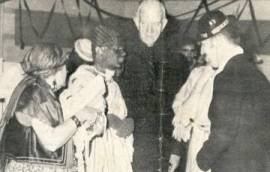 Richard’s color palette also had some darker tones. As we all recall, Darrow had a group of mostly bachelor faculty men who would get together on Friday evenings to drink and play cards, often up at Coach Mahnken’s house (where they could carouse until the wee hours without disturbing kids in a dorm.) Richard joined that hard-drinking crowd. Legend has it (I did not witness this, and if anyone can do so, please confirm or correct the story) that early one Saturday morning, after one such boozy Friday, Richard was seen (and heard) running up the school road, his Turkish bathrobe flowing in the breeze, flailing his camel whip and cursing (in Turkish, of course) at an imaginary camel.
Richard’s color palette also had some darker tones. As we all recall, Darrow had a group of mostly bachelor faculty men who would get together on Friday evenings to drink and play cards, often up at Coach Mahnken’s house (where they could carouse until the wee hours without disturbing kids in a dorm.) Richard joined that hard-drinking crowd. Legend has it (I did not witness this, and if anyone can do so, please confirm or correct the story) that early one Saturday morning, after one such boozy Friday, Richard was seen (and heard) running up the school road, his Turkish bathrobe flowing in the breeze, flailing his camel whip and cursing (in Turkish, of course) at an imaginary camel.
As we entered our junior year, then, we had a variety of impressions of our English teacher. But none of us was quite prepared for the actual classroom experience. If his faculty colleagues felt intimidated, imagine how a bunch of 16-year-olds reacted. Our most searing early evidence that we were not in sophomore English any more came, for most of us, when we got our first “theme,” or creative writing assignment, back with Richard’s grade on it. He graded themes on two components: Content (the quality of our ideas and how well we expressed them), and Mechanics (spelling, punctuation, grammar). Any reasonably well stated essay could earn a decent mark for Content, but Mechanics was (were?) another story. Small mistakes drew large penalties. A spelling error—minus 25. Major errors of grammar or punctuation—minus 25. More venial grammatical sins, misplaced commas and the like—minus 10. There was no minimum score on Mechanics; if your sloppiness resulted in a cumulative penalty of 175 points off, you got a -75. Combine that with a 75 for Content and take the average, and your theme for that week earned a 0. One poor kid, a foreign student whose English was quite limited, got a grade of -465 on a theme. Not on mechanics—that was his overall grade for the paper, and the poor guy finished the first quarter with a negative grade in the course. Native-born English speakers didn’t always fare too much better. Carl Sharpe recalls wondering “how I could ever explain my first-marking-period grade of 45 in English to my father.” Carl had lots of company.
There was, of course, a method in this madness. Long before “teaching to the test” was a national mantra, Darrow recognized that junior English was the place to prepare students for the SAT Verbal test, which we would all take in the fall of our senior year. So Richard’s course was designed to impress indelibly on our malleable minds the rules of grammar, to imprint us with correct spelling and an expanded vocabulary. Beyond his sadistic theme-grading, Richard spent hours each week drilling us, using Kittredge and Farley—a classic grammar book first published in 1913—and several other more modern “workbooks” designed to teach the exact set of writing and reading skills tested for by the SAT. God, were those drills boring! But they worked. Dozens of classmates still attest to the fact that they really learned the mechanics of English writing skills at Darrow, no small part in Richard’s class.
Richard himself found the drills deadly dull. He had a low boredom threshold and occasionally poor impulse control, and sometimes amused himself, and the class, by mocking the drudgery as we plowed through it. Once, Mike Terry was reading aloud from an exercise in Kittredge and Farley, in which he had to insert the proper punctuation into a sentence. Mike began reading, “My dear, comma, you’ve been misled, comma….” Mike pronounced the last word miss-LED, which of course is correct. But as he did so, Richard burst out, “MIZE-uld!” (Well, the word does look as if it should be pronounced that way, and the thought had no sooner crossed Richard’s mind than it was out his mouth.) Mike was taken aback, and said something like, “Excuse me, Sir?” Richard couldn’t back down now, so he exclaimed. “MIZE-uld! The word is pronounced MIZE-uld.” Mike stood his ground, “Sir, I’ve always been taught that it was pronounced miss-LED.” “Well, then you’ve always been MIZE-uld!,” said Richard. Checkmate. At that point the whole class, including Richard and Mike, broke up laughing.
Richard made English entertaining in other ways, too. When we were studying a play, he would appoint students to roles, and have us read lines as if we were rehearsing to perform the play. Sometimes Richard would read all the roles himself. Carl remembers him shouting “Rise and shine, rise and shine,” as he acted Amanda in “The Glass Menagerie.” He also did a wicked Lady Macbeth. While we were studying the Tennessee Williams play, Richard arranged for a junior class field trip to Williamstown, where Menagerie was then being performed by the community theatre troupe. Richard would also express his creativity (and challenge ours) in the topics he assigned for themes. Carl remembers “How I lost my minaret.” My own favorite was a Turkish proverb, “An inexperienced duck dives tail first.”
Richard displayed enormous energy and a passion for teaching in his classroom. When we were studying Macbeth, Richard explained in some detail how plays were staged in Shakespeare’s day. Swordfights, he told us, were as artfully choreographed back then as in a Hollywood movie. The stage had platforms at multiple levels, and the actors would leap up and down, adding to the drama of the fight scene. To show us what he meant, Richard moved his chair a couple of paces away from his desk, then, standing in front of the blackboard, he drew an imaginary rapier, and began dueling with an invisible foe. Back and forth across the front of the room, the battle raged. Then Richard leapt up onto his chair, gaining leverage on his opponent, down on the floor. Not content with that advantage, Richard leapt from the chair to his desktop, knocking the chair over loudly in the process. A few more thrusts and parries, and he leapt down from the desk to the floor, ending the battle with one deadly thrust (victorious, of course). A moment later, the classroom door opened and Lester Henderson poked his head in. Lester was Master of the Day, and the MOD’s office was right below Richard’s classroom. “I heard a crash—is everything OK?,” Henderson inquired. “Yes, yes, we’re fine,” said Richard, somewhat out of breath. Mr. Henderson withdrew, and we all shared another good laugh.
While his grading system was frightening, most of us soon realized we loved English class with Richard. I was in a section that had English first period on Saturday morning, at 8:00. It was not unusual for Richard to fail to show up for that class. After one of those hard-drinking Friday nights, he’d sleep through his alarm. School policy said that in such situations, students should wait ten minutes, then go to study hall. But none of us wanted to miss English. We’d send a delegate (usually me or Huib Soutendijk) over to Hinckley to bang on his door until we got a coherent response, and demand that he come to class. He would show up a few minutes later, bleary-eyed, a cup of coffee in one hand, a cigarette in the other (Carl says they were Gauloises, but I prefer the camel-dung story), and teach. He taught us not just grammar and literature, but more than a few life lessons, those wintry Saturdays.
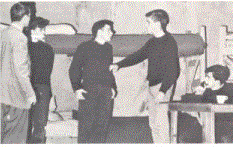 As happens at Darrow, Richard intersected our lives in many ways outside the classroom. He did not coach any sports teams, but he directed the Dramatics Club. Our sophomore year, the year Richard returned to Darrow, the school had just opened the refurbished Shaker Dairy Barn, as a gym and auditorium, with a theatre stage. The Dramatics Club was established that year, and Richard coached it for the next three years. With more than 35 students and the occasional faculty member and/or spouse taking part, the group put on several one-act plays, plus more complex dramas like George S. Kaufmann’s If Men Played Cards as Women Do, Percival Wile’s The Moving Finger, and O’Neill’s In The Zone, among others. The play shown here, not identified in the 1962 yearbook, was Stalag 17, I believe. Carl Sharpe and Howdy Davis had lead roles, and Richard (at left in the photo) was also in the cast.
As happens at Darrow, Richard intersected our lives in many ways outside the classroom. He did not coach any sports teams, but he directed the Dramatics Club. Our sophomore year, the year Richard returned to Darrow, the school had just opened the refurbished Shaker Dairy Barn, as a gym and auditorium, with a theatre stage. The Dramatics Club was established that year, and Richard coached it for the next three years. With more than 35 students and the occasional faculty member and/or spouse taking part, the group put on several one-act plays, plus more complex dramas like George S. Kaufmann’s If Men Played Cards as Women Do, Percival Wile’s The Moving Finger, and O’Neill’s In The Zone, among others. The play shown here, not identified in the 1962 yearbook, was Stalag 17, I believe. Carl Sharpe and Howdy Davis had lead roles, and Richard (at left in the photo) was also in the cast.
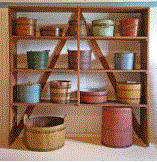 Richard’s theatre experience had other benefits for the school. The summer after our sophomore year, Mr. Heyniger was preparing to renovate the Shaker Medicine Shop, up the hill behind Valentine Cottage, to add dormitory space. Before the building could be restored, it had to be cleaned out: For years, it had been used to store hundreds of Shaker seed boxes, huge wooden laundry devices, bottles and numerous other artifacts. (Some of us who explored the old buildings in our free time swiped a few of those smaller artifacts, and took them home; the rest of us can only wish we had.) Mr. Heyniger decided to hold an auction on the school premises that July. Richard was the auctioneer, a role he relished. Most of the major pieces went to the local Shaker museums, in Hancock and Chatham. The auction raised something like $60,000 for the school—practically an unheard of sum, in those days.
Richard’s theatre experience had other benefits for the school. The summer after our sophomore year, Mr. Heyniger was preparing to renovate the Shaker Medicine Shop, up the hill behind Valentine Cottage, to add dormitory space. Before the building could be restored, it had to be cleaned out: For years, it had been used to store hundreds of Shaker seed boxes, huge wooden laundry devices, bottles and numerous other artifacts. (Some of us who explored the old buildings in our free time swiped a few of those smaller artifacts, and took them home; the rest of us can only wish we had.) Mr. Heyniger decided to hold an auction on the school premises that July. Richard was the auctioneer, a role he relished. Most of the major pieces went to the local Shaker museums, in Hancock and Chatham. The auction raised something like $60,000 for the school—practically an unheard of sum, in those days.
I lived in Hinckley House for three years, with Richard as a housemaster. Among other things he did for us, he taught us how to write a check properly, so we could withdraw money from our SDAs. He set up his TV in the common room, so we could watch John Glenn’s return from his historic Earth-orbiting flight. His room inspections were notorious. On Sundays, we would have an hour or so to clean and tidy up, then in would stride Richard, wearing white gloves, and he’d run a finger over hidden surfaces (like the top of a door frame) that we’d failed to dust. Now and then, he’d also pull “surprise” inspections during weekdays, while we were in class (woe betide the kid who didn’t make his bed.) Like theme mechanics, Richard scored room tidiness on a point system. We all had to help clean the dorm’s common areas. Those who accrued relatively few points got to sweep the halls, while the big point-getters got the nastier chores, like cleaning the urinals or hauling the trash to the dump behind the Dairy Barn. Richard kept a chart showing everyone’s scores on the wall outside his door, so we’d know where we stood.
 Student nicknames for teachers were often borderline cruel; for instance, we called Ron Emery, who limped as a consequence of childhood polio, “The Duck.” Richard was called “Pigeon,” and it fit. He was rather birdlike. He walked with his chest thrust forward and a faint bobbing motion of his head. He never seemed to mind the nickname, which tended to diminish our incentive to use it. Richard was not often the target of student pranks. His bed got short-sheeted once or twice (don’t ask me how I know that). I remember once Richard was sitting in his car, a gray Karman Ghia, in front of Hinckley. He was about to drive off on some errand, but had stopped for a moment to chat with me and a couple of other students. We were standing in the road; Richard had his window down and was looking out at us. At that moment, the hockey team walked by—Frank Rosenberg, R.J. Brandes, Anson Perina. One of them shot me a look and whispered “Keep him talking.” I prattled on while three husky guys surreptitiously lifted the back bumper of the car, so that the rear wheels were barely off the ground. At their nod, I stopped talking, Richard said “’Toodle-oo,” and stepped on the accelerator. With no traction, the engine revved up to about 6,000 rpm, the guys dropped the rear end, and Richard took off down the road in the proverbial cloud of dust, tires squealing, fishtailing like mad. We were lucky no one was killed.
Student nicknames for teachers were often borderline cruel; for instance, we called Ron Emery, who limped as a consequence of childhood polio, “The Duck.” Richard was called “Pigeon,” and it fit. He was rather birdlike. He walked with his chest thrust forward and a faint bobbing motion of his head. He never seemed to mind the nickname, which tended to diminish our incentive to use it. Richard was not often the target of student pranks. His bed got short-sheeted once or twice (don’t ask me how I know that). I remember once Richard was sitting in his car, a gray Karman Ghia, in front of Hinckley. He was about to drive off on some errand, but had stopped for a moment to chat with me and a couple of other students. We were standing in the road; Richard had his window down and was looking out at us. At that moment, the hockey team walked by—Frank Rosenberg, R.J. Brandes, Anson Perina. One of them shot me a look and whispered “Keep him talking.” I prattled on while three husky guys surreptitiously lifted the back bumper of the car, so that the rear wheels were barely off the ground. At their nod, I stopped talking, Richard said “’Toodle-oo,” and stepped on the accelerator. With no traction, the engine revved up to about 6,000 rpm, the guys dropped the rear end, and Richard took off down the road in the proverbial cloud of dust, tires squealing, fishtailing like mad. We were lucky no one was killed.
Richard was a man of many talents, not all of them visible. Carl Sharpe recalls that one day, probably during a break in a play rehearsal, he was sitting at the piano in the Dairy Barn, playing some tune or another. Richard sat down beside him on the piano bench, and asked if Carl could play “Moonglow.” Carl knew the song but had never tried to play it. Richard then played the song, showing Carl the chord progression and using it in a very sophisticated way. Carl says he still uses that chord progression, and was shocked—both by the ingenious nature of the chord manipulation, and by Richard’s knowledge. Carl had never seen him play the piano before (or after) that, but got the impression that “this was a Renaissance man.”
Pete Loomis remembers that Richard—on those rare occasions when he came to breakfast in the Dining hall—used to ask the kitchen to bring him two raw eggs in a drinking glass, which he’d drink right down. “Gag me!” says The Wop, which was probably the point. Carl recalls that at one of our annual “talent nights,” a Friday school meeting filled with musical performances and the traditional farcical skit in which students mock the faculty, he (Carl) was assigned to play the role of Richard. In the middle of the skit, on cue, Carl, who was sitting in the audience, rose to his feet and began waving his hands, “screaming orders and deprecations, moving around the audience like a madman, pointing and gesticulating. Everybody knew I was supposed to be Mr. Bethards, and it was very funny.” Carl says Richard told him later he really enjoyed it.
Richard shocked some of us on at least one other occasion. We were having “President’s Fitness Day”—a JFK initiative—in which the entire student body moved from station to station around the gym, doing push-ups, sit-ups, squat-thrusts, chin-ups. Faculty were posted at various stations to record how many reps each student did. I was up in the wrestling balcony at the chinning bar, having just finished that exercise (I did about 7, I think, and was fairly proud of myself.) Richard was recording chin-up achievements. Chip Dismukes, our 121-pound wrestler, a muscle-bound, compact athlete, was next up. He did 21, which elicited a comment from Richard, something like “Well done. Best so far.” Chip looked at Richard and said, “Gee, how many can you do, Sir?,” a challenge to Richard’s manhood resonating in his voice. Remember, this was Pigeon, known for his rapier wit, his prodigious consumption of cigarettes and whiskey and his sleight physique, not for his muscular feats. “Well, let’s find out,” said Richard. Chip and I had to boost him up to the bar—he couldn’t reach it by jumping. He then proceeded to do 25 chin-ups in quick succession with no evident strain. “That should be enough,” he said, and dropped to the mat. I don’t recall if he dusted off his hands, but the gesture would surely have fit. Dismukes stood there with his jaw drooping. I hid my surprise, but I was incredibly impressed.
Students might have felt comfortable challenging Richard’s manhood, perhaps because he was fairly obviously gay. Such things were not openly discussed at Darrow in those days, unless there was a scandal (as with the chaplain, our senior year.) Richard was never scandalous; he kept his private life private and, as far as everyone knew, resisted any temptation associated with being surrounded by teenage boys. For me at least, I thought he was gay. More striking was that it didn’t seem to matter, to Mr. Heyniger or to anyone else. Richard was an outstanding teacher, and his sexual orientation seemed irrelevant. That was how I felt, too. I didn’t realize until later that Darrow was probably unusually tolerant in that regard.
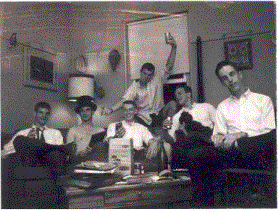 Before we knew it, we were finished with junior English, then our senior year seemed to fly by. This photo was taken in Richard’s apartment in Hinckley house, the evening before Commencement, 1962. Some parents had already arrived for the next day’s ceremony; that’s Zsa Zsa, Frank’s toy poodle, on his lap. Richard invited the dorm’s seniors in for a celebration, since all eight of us were graduating the next day. He offered us a beer (“What are they going to do, kick you all out now?”) As you can see, Gib, Joe, Frank and R.J. (doing his best King Kong imitation for the camera) accepted, while I declined (and crossed my eyes as the shutter clicked). I think Huib Soutendijk took the picture, with Frank’s Polaroid. Llew Haden and John Prentiss missed the party, or at least the photo. Richard, always in character as the eccentric professor, wore his auctioneer’s hat, went topless on that hot evening, and carried his room inspection clipboard.
Before we knew it, we were finished with junior English, then our senior year seemed to fly by. This photo was taken in Richard’s apartment in Hinckley house, the evening before Commencement, 1962. Some parents had already arrived for the next day’s ceremony; that’s Zsa Zsa, Frank’s toy poodle, on his lap. Richard invited the dorm’s seniors in for a celebration, since all eight of us were graduating the next day. He offered us a beer (“What are they going to do, kick you all out now?”) As you can see, Gib, Joe, Frank and R.J. (doing his best King Kong imitation for the camera) accepted, while I declined (and crossed my eyes as the shutter clicked). I think Huib Soutendijk took the picture, with Frank’s Polaroid. Llew Haden and John Prentiss missed the party, or at least the photo. Richard, always in character as the eccentric professor, wore his auctioneer’s hat, went topless on that hot evening, and carried his room inspection clipboard.
We didn’t know it at the time, and in fact Richard might not have known it then, either, but he, like the class of ’62, was about to “be graduated from” Darrow. He didn’t return to the school that fall. Years later, at our 10th reunion, I asked Ron Emery why Richard had left, and how the school could have let such a gifted teacher go. Ron told me, “Richard worshipped The Boss, and he was pretty devastated when he died.” As Ron told it, Richard was not terribly impressed with John Joline, a man about his own age, who didn’t measure up to Mr. Heyniger, in Richard’s eyes. From John’s side, “Richard wasn’t masculine enough for John’s taste,” as Ron put it. It was never clear to me whether it was Richard’s own choice, or he was asked to leave, or he and John came to a mutual decision. But just as we did, Richard left Darrow that summer, and headed off to discover the next stage of his life.
I lost track of Richard for several years. Eventually, when I began writing the class newsletter, I got everyone’s address from Jack Van Vorst, and tracked Richard down. When he first wrote back, in 1968, he sent just a short note—he didn’t say from where—to let me know that he expected to be passing through San Francisco (I was in grad school at Stanford at the time), and hoped we could meet for dinner. That didn’t happen, but a few years later, in response to another news request, Richard called me, and we had a long conversation, in which he filled me in on the 10 years or so since he had left Darrow.
 Richard spent that first year, 1962-63, in New York City, teaching, but “hated it.” he answered an ad in the NY Times for a company that supplies teachers to the government, and soon found himself working for Uncle Sam. Uncle needed teachers to work with military officials in non-English-speaking countries where the US provided military aid, to teach their troops English, so they could communicate with their American advisors. Technically, Richard was employed by the US Military Mission. His first posting was in the Congo, where he had “entertaining and fascinating” experiences. He was then sent to Liberia (photo), where among other things, he “wrote about 18 textbooks for literacy courses, making them relevant to the culture and customs of Liberia.”
Richard spent that first year, 1962-63, in New York City, teaching, but “hated it.” he answered an ad in the NY Times for a company that supplies teachers to the government, and soon found himself working for Uncle Sam. Uncle needed teachers to work with military officials in non-English-speaking countries where the US provided military aid, to teach their troops English, so they could communicate with their American advisors. Technically, Richard was employed by the US Military Mission. His first posting was in the Congo, where he had “entertaining and fascinating” experiences. He was then sent to Liberia (photo), where among other things, he “wrote about 18 textbooks for literacy courses, making them relevant to the culture and customs of Liberia.”
While he was in Liberia, Richard met Hazel, an African-American woman, an MD working on public-health problems there. Unfortunately, Richard never shared Hazel’s last name with us, but not long after they met, in 1968, they were married. I recall remarking to Richard when he told me this that I was surprised to hear that he had married. He said “I was surprised, too! I thought I’d never get married.” But he said Hazel was perfect for him, intellectually, culturally and in personality. “This was the love of my life, and it happened, and I was joyful,” he told me.
 Richard’s work for the USMM in Liberia was apparently satisfactory, and he was promoted and transferred—to Djakarta, Indonesia, early in 1968. His job there was English Language Coordinator for the entire Indonesian armed forces. Hazel spent some time at the University of Michigan, getting a second Master’s degree, then joined Richard in Indonesia. In 1970, she was diagnosed with cancer, and died later that year, in a hospital in Singapore.
Richard’s work for the USMM in Liberia was apparently satisfactory, and he was promoted and transferred—to Djakarta, Indonesia, early in 1968. His job there was English Language Coordinator for the entire Indonesian armed forces. Hazel spent some time at the University of Michigan, getting a second Master’s degree, then joined Richard in Indonesia. In 1970, she was diagnosed with cancer, and died later that year, in a hospital in Singapore.
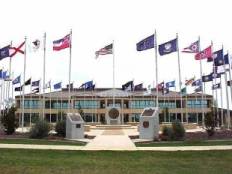 When I spoke with him in 1972, Uncle Sam had transferred Richard back to the USA. He was working at Lackland Air Force Base in San Antonio, as a branch chief, administering programs to teach teachers how to teach English as a Second Language. The program he supervised had students from 17 countries, and said he spent most of his time “solving problems—something new to adapt to every 10 minutes. I love it!”
When I spoke with him in 1972, Uncle Sam had transferred Richard back to the USA. He was working at Lackland Air Force Base in San Antonio, as a branch chief, administering programs to teach teachers how to teach English as a Second Language. The program he supervised had students from 17 countries, and said he spent most of his time “solving problems—something new to adapt to every 10 minutes. I love it!”
My brother David (Darrow ’65) lived in San Antonio while Richard was there, and on one occasion, when I was visiting my brother, we called up Richard, and he invited us over to his home for dinner. I have almost no memory of that visit, but David recalls that Richard lived on the west side of San Antonio, “not a bad place, but you kept your doors locked.” He remembers that Richard’s house was filled with exotic artifacts from around the world, and that Richard remarked that if his home were ever burgled, the perps “would probably steal my $200 TV and stereo and leave the $5,000 Persian rug.”
In 1972, in that long phone conversation, Richard remarked that he was kind of amazed he was still alive. He was 48, but said he didn’t feel it. He had survived a heart attack in Djakarta, malaria in the Congo, hepatitis in Singapore. He would have loved to be at our 10th reunion (the occasion for the call was in fact my attempt to persuade him to come), and he said we were a special class to him, but he just couldn’t make it.
 I next heard from Richard in 1973, this time a letter from Riyadh, Saudi Arabia, where he had been sent to coordinate English training for the Saudi armed forces. His letter read like a junior English theme on the topic “Describe a Bedouin feast.” He recounted in lavish prose being led by the hand by a berobed Major General into the dining area, seated at the place of honor on the carpet, and dipping his (right) hand into a “great platter, nearly overflowing with a sea of rice cooked in milk, on which appears to float the carcass of a whole lamb,” from which his host picked “choice, tender morsels for my special delectation.” He said he felt as if he’d stumbled into a 19th-Century travel book. He asked me for the Brodheads’ address in Beirut, and planned to visit them. He said his job involved a great deal of travel, “but the people are fascinating and the work challenging.”
I next heard from Richard in 1973, this time a letter from Riyadh, Saudi Arabia, where he had been sent to coordinate English training for the Saudi armed forces. His letter read like a junior English theme on the topic “Describe a Bedouin feast.” He recounted in lavish prose being led by the hand by a berobed Major General into the dining area, seated at the place of honor on the carpet, and dipping his (right) hand into a “great platter, nearly overflowing with a sea of rice cooked in milk, on which appears to float the carcass of a whole lamb,” from which his host picked “choice, tender morsels for my special delectation.” He said he felt as if he’d stumbled into a 19th-Century travel book. He asked me for the Brodheads’ address in Beirut, and planned to visit them. He said his job involved a great deal of travel, “but the people are fascinating and the work challenging.”
In the fall of 1974, when I was living in Washington, Alice and I drove down to see Colonial Williamsburg, and while there we had dinner with Bill and Beverly Goff. The Goffs mentioned that Richard had visited them, some months before, when he was in town for a class reunion (it would have been his 25th) at William and Mary. Richard had been at Darrow for alumni day on the same trip, then he had headed back to Saudi Arabia.
In 1976, Richard passed through Washington en route home to San Antonio, and we got together for a drink. He suggested we meet at a bar in Georgetown; he said it was one of his favorites, told me it was a gay bar, asked me if I minded. I said anything was OK. After he caught me up on his latest adventures, and after a few drinks, Richard began explaining to me how various people we knew (long-time bachelor former Darrow teachers, for the most part) were all gay, even if they themselves didn’t realize it. At one point that evening I told Richard that Alice and I were getting divorced. He asked, “Is it because…you’re gay?” I said, “No, Richard, I’m not gay, we just don’t love each other anymore.” He responded, “Good. Don’t be gay, Ned, don’t be gay.” That was the only time I can recall that Richard ever discussed sexual orientation with me, or showed anything less than satisfaction with any aspect of his life. On his way back to Texas (sort of), Richard was planning to visit with Lester Henderson, at the Athenian School in the San Francisco Bay Area.
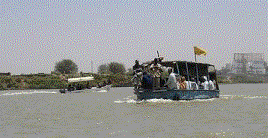 Back in San Antonio, Richard had been promoted again. He was now in charge of the ESL program at Lackland, heading a staff of 176 professionals and 10 clerical workers, training from 1,100 to 1,600 foreign military students at a time. One part of the program taught English so the students could pursue advanced military studies in the States; another part taught teachers how to teach English, back at home. Richard had traveled to Egypt and the Sudan that year, on official business. “The Sudan was fabulous—boat trips on the Blue and White Nile at their confluence, people so charming that they rate as the best and most polite I’ve ever seen.” He was pleased that my parents (who had just moved to New Mexico, and visited David in San Antonio) had stopped in to see him. He said that “Ronsey” had visited, and he expected to see him again in a month or so. (In fact, Ron was disengaging from Darrow at that point; his search for a job in theatre in the Berkshires didn’t work out, and Richard helped him find a job teaching English for Lockheed, in Jeddah, Saudi Arabia.)
Back in San Antonio, Richard had been promoted again. He was now in charge of the ESL program at Lackland, heading a staff of 176 professionals and 10 clerical workers, training from 1,100 to 1,600 foreign military students at a time. One part of the program taught English so the students could pursue advanced military studies in the States; another part taught teachers how to teach English, back at home. Richard had traveled to Egypt and the Sudan that year, on official business. “The Sudan was fabulous—boat trips on the Blue and White Nile at their confluence, people so charming that they rate as the best and most polite I’ve ever seen.” He was pleased that my parents (who had just moved to New Mexico, and visited David in San Antonio) had stopped in to see him. He said that “Ronsey” had visited, and he expected to see him again in a month or so. (In fact, Ron was disengaging from Darrow at that point; his search for a job in theatre in the Berkshires didn’t work out, and Richard helped him find a job teaching English for Lockheed, in Jeddah, Saudi Arabia.)
In August, 1986, the New York Times ran a story about the English Language Center at Lackland AFB, describing its programs in detail. By then, the Times wrote, the program had military people from over 70 countries enrolled, a sign of the vast extent of US military ties with other nations. Files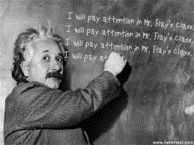 on each student reflected both their academic records and observations about abilities and attitudes. The reporter noted that, since foreign governments were paying for the instruction, the reports were sent back to the sponsoring countries, but the files went first to the American Embassy, so that “sensitive information” could be removed. As an officer at Lackland explained, “The Ambassador may not want to be the bearer of news that a student wasted his time or was a playboy while here—not when the student is the son of a sultan or the defense minister.” As far as I knew, Richard had never been concerned with that kind of diplomacy—he just loved teaching teachers how to teach English.
on each student reflected both their academic records and observations about abilities and attitudes. The reporter noted that, since foreign governments were paying for the instruction, the reports were sent back to the sponsoring countries, but the files went first to the American Embassy, so that “sensitive information” could be removed. As an officer at Lackland explained, “The Ambassador may not want to be the bearer of news that a student wasted his time or was a playboy while here—not when the student is the son of a sultan or the defense minister.” As far as I knew, Richard had never been concerned with that kind of diplomacy—he just loved teaching teachers how to teach English.
What, never? Well, hardly ever….Once, Richard did comment on the politics of his job, a little. I was on the phone with him in 1979: The Shah of Iran had just been deposed, and after treatment for cancer in NYC, had traveled to Lackland AFB, where he was greeted by a large contingent of loyal Iranian military men, students at Richard’s school. Richard didn’t think much of Iranians (“a lackey people”), and predicted that the Islamic revolutionary government headed by the Ayatollah Khomeini would be “lucky if it lasts more than a few months.” If only. Richard was a far better teacher than a political prognosticator. Fortunately, he made the right career choice.
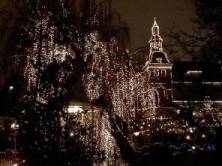 In 1981, gathering news for the newsletter, I called Richard, and learned that his job just kept growing. The Air Force had decided that, before it could train its recruits in a foreign language, they needed to know English grammar, a skill in which most were woefully deficient. And guess who had been tapped to spearhead the new English-as-a-First-Language program? Richard was not travelling much for work anymore, but was planning a trip to Denmark for Christmas. He had lived in Denmark for a while as a young man, and a year or so before we talked, while he was in New Jersey for a wedding, Richard met a Danish woman in a bar, who knew his best friend in Copenhagen. Richard scrawled a note on a cocktail napkin and sent it back with her, and was soon invited to come Denmark to renew acquaintances, after 30 years.
In 1981, gathering news for the newsletter, I called Richard, and learned that his job just kept growing. The Air Force had decided that, before it could train its recruits in a foreign language, they needed to know English grammar, a skill in which most were woefully deficient. And guess who had been tapped to spearhead the new English-as-a-First-Language program? Richard was not travelling much for work anymore, but was planning a trip to Denmark for Christmas. He had lived in Denmark for a while as a young man, and a year or so before we talked, while he was in New Jersey for a wedding, Richard met a Danish woman in a bar, who knew his best friend in Copenhagen. Richard scrawled a note on a cocktail napkin and sent it back with her, and was soon invited to come Denmark to renew acquaintances, after 30 years.
Richard enjoyed such reunions so much, it’s a pity he never made it to one of ours. After 1982, I was busy with family and an ever more challenging job, and I stopped writing class newsletters, losing touch with many classmates and former teachers in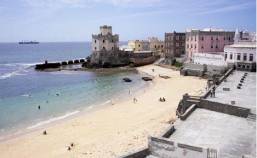 the process. I didn’t hear from Richard again until 1987, when I was organizing our 25th. He returned the tear-off form I had mailed out, along with a lengthy typed letter—the only typed correspondence I ever had from Richard. He was writing from Mogadishu, Somalia, using his new Atari 130 word processor, “the best buy I ever made, for under $700,” and coping with the highly erratic local power supply. He said, “You have no idea how much I want to participate in your reunion,” and he hoped very much to attend, but expressed some caveats. He had pretty much blown his travel budget for the year, with a vacation over Christmas and New Year’s that had taken him to England, Denmark, The Netherlands and Kenya. He hoped to fly at Air Force expense from Mogadishu to Nairobi to Frankfurt, and to connect on from there to New York.
the process. I didn’t hear from Richard again until 1987, when I was organizing our 25th. He returned the tear-off form I had mailed out, along with a lengthy typed letter—the only typed correspondence I ever had from Richard. He was writing from Mogadishu, Somalia, using his new Atari 130 word processor, “the best buy I ever made, for under $700,” and coping with the highly erratic local power supply. He said, “You have no idea how much I want to participate in your reunion,” and he hoped very much to attend, but expressed some caveats. He had pretty much blown his travel budget for the year, with a vacation over Christmas and New Year’s that had taken him to England, Denmark, The Netherlands and Kenya. He hoped to fly at Air Force expense from Mogadishu to Nairobi to Frankfurt, and to connect on from there to New York.
And, he mentioned, he had another reason to come home. “I almost never complain and have over eight months of sick leave in reserve because I so seldom need it, but since my return in January, I have been unwell,” Richard wrote. He felt he needed a complete physical with x-rays, more than he could get in Somalia. He said, “I do not fear cancer. It is rather as if I am suffering from some sort of muscular problem in three places at once.” He described what felt like “bursitis of the hip,” and also had had a recurrent low-grade fever.
Just then, Mogadishu experienced a power failure, and Richard lost several paragraphs he could not reconstruct, because he hadn’t saved the document often enough. He finished the letter in longhand, and promised to let us know when he made his travel plans. He hoped to pass through New York en route to San Antonio, so he could attend our reunion.
That letter, Richard’s last to me, was dated March 6, 1987. At the end of May, just a week or two before Darrow’s Alumni Weekend and our reunion, I got a call from the school, telling me that Richard had died, on May 26th, in Chicago, of cancer. He was 62. I couldn’t help but recall his remark, 14 years before, that he was amazed he had lived to be 48. He certainly crammed an enormous amount of pleasure, accomplishment and adventure into the years he had.
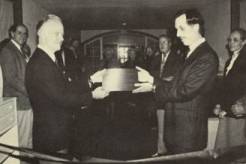 Darrow was conducting a capital campaign that year, to restore Wickersham, which had fallen into disrepair from years of hard use and strapped maintenance budgets. Our class had raised $25,000 to refurbish the Winter Meeting Room, the study hall/library in our day. We quickly agreed that we would like to dedicate the restored room to Richard. The school was amenable—large gifts carry naming rights—but the bronze plaque was not made in time for a ribbon-cutting during reunions, so the room was dedicated when I was on campus for a Trustee meeting that autumn. In remarks at the ceremony, Ron Emery recalled that when Richard first had seen the room, with its curved ceiling and tall windows, he asked “Why does it look like this?” Now, renamed the “Bethards Room,” Ron said, it looks as it does because of our gift, in memory of an inspiring teacher. By reading this memorial, students who pass through that archway and wonder who Richard L. Bethards was may now get to know him, a little.
Darrow was conducting a capital campaign that year, to restore Wickersham, which had fallen into disrepair from years of hard use and strapped maintenance budgets. Our class had raised $25,000 to refurbish the Winter Meeting Room, the study hall/library in our day. We quickly agreed that we would like to dedicate the restored room to Richard. The school was amenable—large gifts carry naming rights—but the bronze plaque was not made in time for a ribbon-cutting during reunions, so the room was dedicated when I was on campus for a Trustee meeting that autumn. In remarks at the ceremony, Ron Emery recalled that when Richard first had seen the room, with its curved ceiling and tall windows, he asked “Why does it look like this?” Now, renamed the “Bethards Room,” Ron said, it looks as it does because of our gift, in memory of an inspiring teacher. By reading this memorial, students who pass through that archway and wonder who Richard L. Bethards was may now get to know him, a little.
A few years ago, I got an e-mail from the school, passing on an inquiry they had received from a man named Rick Davis. He said he was Richard Bethards’ nephew; his full name is Richard Bethards Davis. Rick was looking for Darrow contacts who could tell him more about his uncle’s life. We corresponded briefly, and I shared some of the stories told here. I later also heard from Rick’s sister, Penny Chelucci, Richard’s niece. Richard never spoke with me about his family, but he had a sister, Rick and Penny’s mother. Rick said Richard was his favorite uncle, a source of many cherished memories, and used to stay with him and his wife when he came back to the States. I learned more about Richard’s brief life with Hazel, from Penny. She called Hazel “an amazing woman,” who was committed to try to eradicate parasitic diseases that afflict children in Africa. “She was a very large, very black and very intelligent, kind woman whom we all loved very much.” Hazel and Richard had an “understanding” that he could have a private love life if he chose to, as long as he kept his liaisons out of their home, and caused her no social embarrassment. Penny said “They were on the same plane culturally, and they enjoyed the same foods, drinks and companionship. He had jewelry made for her, some of which I inherited on my mother’s death. Since they are big pieces, made for a large woman, and I am the taller of two daughters (at 5’5” I’m a giant in our family), my mother decided they should come to me. I love them. I think of Hazel with love each time I wear them—and of course my love for my Uncle Richard, who had them designed and made for Hazel.” She also remarked that Richard “was an enormously generous gift giver and we all received treasured pieces from his travels.”
Thank you, Richard, for the many gifts—mostly the intangible ones—that you gave to the Class of 1962, gifts that live on for us each time we pick up a pen or pound a keyboard.

Home | Class News | 50th Reunion | Past Reunions | Other Gatherings | Newsletter Archive | Links | Memorials | Classmates Search | Classmates Found | Former Faculty | Contacts |